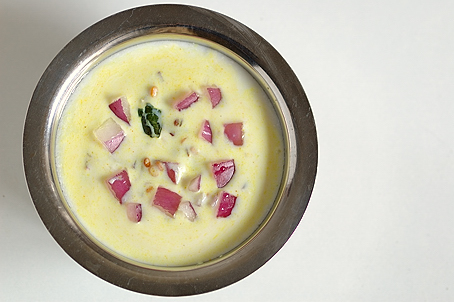
Perugu Pacchadi: Refreshing Preparation with Perugu, Onions and Popu
From Bharath for Jihva Onions at Radhi’s Kitchen
~ Indira

~ Indira
Peanut – jaggery chutney is a timeless classic. Like the comfort of the Kashmir shawl wrap on a cold day and the elegance of kumkum bottu on the forehead after a visit to the temple, it can be relied on to instantly make the meal both totally comforting and effortlessly elegant.
Stylish enough for a special elaborate meal and at the same time, casual enough for a spur of the moment put-together breakfast or light lunch – Peanut jaggery chutney is a rural Andhra classic side dish and much beloved recipe from my home. Usually prepared in a rolu (mortar) and served during Makara Sankranthi with pulagam or pongali and ghee.
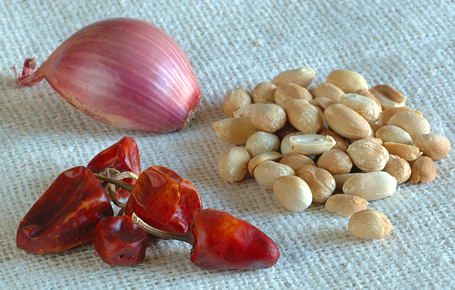
Recipe:
Peanuts – 1 cup
Shallots 4 or one big red onion – cut to chunks
Dried red chillies – 6 to 10. I usually add at least 8 for a cup of peanuts
Tamarind – small marbleround size
Jaggery pieces – 1 tablespoon or to your liking
Salt – 1 teaspoon
Roast peanuts to light brown color. Cool and remove the skins.
In a skillet, heat a tablespoon of peanut oil. Add and fry shallot/onion pieces and dried red chillies to brown color. Let cool to room temperature.
Soak tamarind in a quarter cup of hot water for about 10 minutes, to soften.
Take them all in a blender or in a mortar. Add jaggery and salt. Grind to smooth consistency. Remove to a cup and serve with breakfast items or with chapati/rice along with ghee.
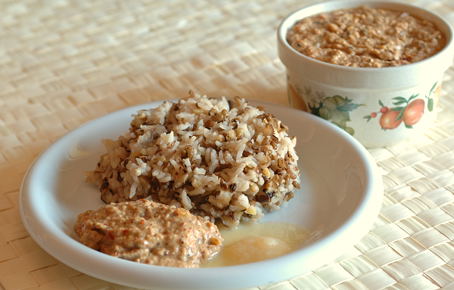
Williams-Sonoma, the kitchenware shop that sells quality kitchen stuff, has a series of cook books – Like their shop, the cookbooks are very clean, organized, not a lot of recipes, but have an excellent presentation and gorgeous photos. The book size is not too big, not too small; they are like short notebooks with color photo on every page. Each book focuses on one topic. So far, Cookies, Cakes, Muffins, Breads and Risotto – these are the cookbooks, I borrowed from my local library and flicked through. More than anything, they are eye candy.
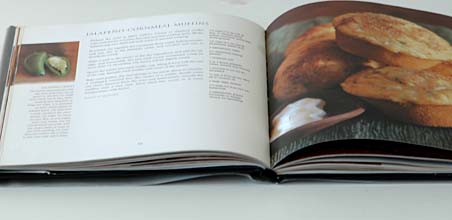
Stephanie of Dispensing Happiness, my blog friend is blogging recipes from ‘Muffins‘ cookbook. When she mentioned last week that she was going to try cornmeal-jalapeno muffin recipe, I wanted to join in and made a baking date with her. After two renewals and before returning the book to the library, I wanted to try at least one recipe. FInally last weekend, I baked cornmeal muffins from the book.
I followed the recipe mostly and also added some extras, because I was preparing these muffins for our supper. In addition to corn meal, all purpose flour, butter milk and baking powder etc, I have also added cabbage, shallot, chickpeas sauté to the cornmeal dough, so that the muffins baked would be more dinner worthy. They turned out, I can’t say excellent, but acceptable, even after all these extras. I can’t imagine the taste if I tried them bland with only just cornmeal and chillies.
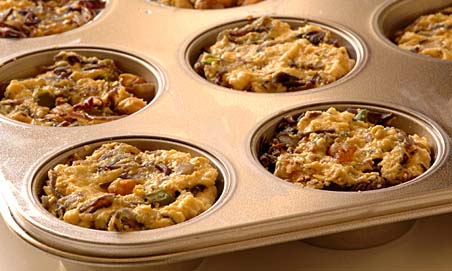
Recipe:
(For 11 muffins)
1½ cups of yellow cornmeal
1 cup all purpose flour (maida)
1½ cups of buttermilk
1 tablespoon peanut oil
1 teaspoon of each – salt, sugar and baking powder
Some cheese gratings to top the muffins
Veggies I added
3 cups of finely chopped cabbage (I used red cabbage)
3 shallots and 6 green chillies- finely chopped
½ cup of chickpeas (soaked overnight)
First I sautéed the veggies together for few minutes, until they are cooked. In the meantime, I mixed all other ingredients together thoroughly without any lumps. I stirred in the sautéed veggie mixture to the dough. Greased the muffin pan with little bit of oil, leaving one muffin cup empty and filling it with water to prevent warping (following the book suggestion). Filled the muffin cups with cornmeal-cabbage dough. I also sprinkled cheese on top of some. Baked them in a preheated oven at 400 F (200C) for about 25 minutes, until they are golden.
They tasted like baked versions of cabbage bajjis (you know the kind, bajjis/pakoras – veggies mixed in a gram flour-jowar flour-rice flour dough, then deep fried — almost like that).
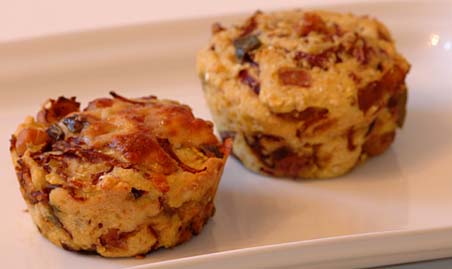
Recipe Source: Adapted from ‘Williams Sonoma-Muffins’, page 46
Things I skipped adding (from the book’s recipe) are 2 eggs, another 1 ½ tsp of baking powder and more oil – reason for my flat muffin tops.
On a blogging break. See you all in a few days.
Last week I purchased one packet of shallots (baby onions). With them, I prepared a south Indian special ‘shallot sambhar’ i.e. tiny, baby onions are first peeled out of their dry skin/coverings, then cooked as whole, in thick lentil (toor dal) soup. Tasty and delightful! Like all babies, they are tiny bundles of joy, a gastronomic kind:) and worth the high price.
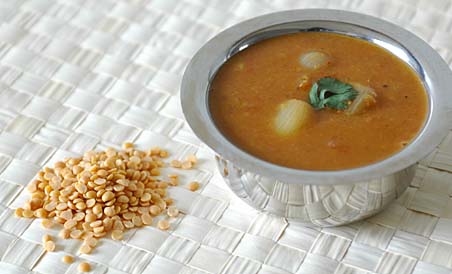
Recipe:
My sambhar cooking routine is a three-step process.
1. Pressure-cook the toor dal until soft, so that it can be mashed/pureed into smooth paste. Soak the tamarind in water to extract the juice.
2. In the meantime, cut and cook vegetables for sambhar- usually tomatoes and vegetables (shallots). The process I follow is like this. Heat one teaspoon of oil a big saucepan, add and toast popu ingredients. To it, I’ll add chopped tomatoes and cook them until they turn soft and mushy. Then I’ll add and cook shallots (or vegetables), one cup of water and also the seasoning (sambhar powder, turmeric, red chilli powder and salt).
3. Simmering 1 and 2 together- To the cooked tomato-shallot mixture, add the mashed toor dal paste and tamarind juice. Stirring in between, let simmer for about 15 to 30 minutes. Just before turning off the heat, garnish with finely chopped cilantro and serve.
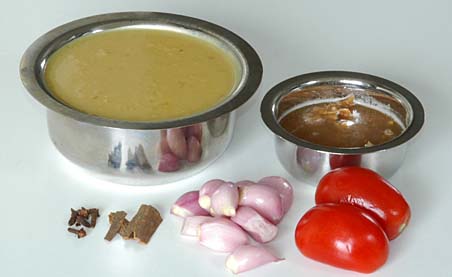
For more detailed sambhar recipe (like how to prepare home made sambhar powder etc.,), check out my other blogged recipes- Okra Sambhar and white radish sambhar.